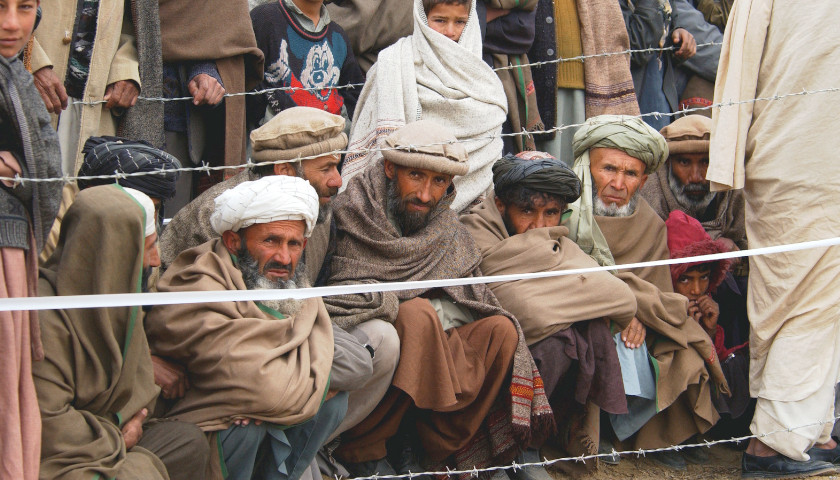by Max Primorac
Despite $775 million in humanitarian aid from the U.S. government since President Joe Biden’s disastrous pullout of U.S. military forces from Afghanistan a year ago, half the population—some 20 million people—remains hungry.
That’s no change from a year ago when we were also told that half the country required emergency food and other lifesaving assistance to avoid a major famine.
Meanwhile, the Taliban that swooped in following our humiliating withdrawal have firmed up their brutal rule and erased all progress the country had made, from educating girls and women to protecting religious minorities.
For more than 20 years, a foreign-aid establishment of government bureaucrats, United Nations experts, contractors, and aid agencies utterly failed to help Afghans gain any semblance of self-sufficiency, leaving behind a failed state and Asia’s poorest country.
Hundreds of billions of dollars in taxpayer funds were wasted, leaving the Afghan people to scavenge for food to survive while the Taliban reestablishes the country as a global terrorist hub.
A year ago, foreign aid constituted a whopping 80% of the government’s budget and nearly half of Afghanistan’s gross domestic product. The entire national economy was fueled by foreign aid, its only rival being the lucrative opium industry.
The breathtaking pace with which the country collapsed into the waiting arms of the Taliban exposed this nation-building effort to be little more than an international welfare program that destroyed the national will to self-sufficiency. Pull the financial plug and the entire assistance house of cards collapsed.
Even Afghan farmers cannot feed themselves, demonstrating the extent to which open-ended foreign-aid policies undercut the most basic economic incentives to even produce food, the most natural human endeavor possible.
Today, those same aid “experts” seek to resurrect past aid programs under an expanded definition of humanitarian assistance. We hear pleas from humanitarians for more money to restart failed education, health, and agriculture projects.
Aid advocates are calling on the U.S. to negotiate with the Taliban to reboot Afghanistan’s banking sector to avert mass hunger and release billions of dollars of Afghan central bank assets frozen by the U.S. government to prevent the Taliban from accessing these funds.
But the cause of the hunger in Afghanistan is not insufficient aid or money, but rather a failed state, an economy broken by aid dependency, and a brutal regime. No amount of aid will change that.
The fact is, we have no idea if the aid we are currently delivering is reaching those in need or is being diverted by Taliban forces for their own use. There is no U.S. embassy or media presence in Afghanistan to monitor those programs.
According to a Woodrow Wilson Center scholar, “the potential for theft, for diversion, for funding terrorism is extraordinarily high.” And that was last year’s assessment.
With most local aid staff having fled the country, a Taliban regime harassing remaining aid workers for a cut of the action, and aid agencies resisting U.S. government calls to vet anyone handling U.S. aid, the prospect that the U.S. is propping up the Taliban is very real.
Should the Biden administration cede to those demands and if Congress chooses to pay for it, we would, in effect, be in a co-governance scheme with the Taliban, in which we take on the regime’s financial obligations to provide social services to their own citizens, while they direct more of their own budget resources to strengthen their power base.
The U.S. in effect would be financing a terrorist state.
This aid trap is unfortunately replicated in dozens of other countries, made worse as the foreign-aid budget has ballooned by one-third since Biden took office. Unfortunately, it’s too late for the Afghan people to escape the double whammy of a corrupt and brutal Taliban regime and an incompetent and self-serving foreign-aid industrial complex that left them unable to feed themselves.
For scores of other countries that find themselves caught in a similar aid trap, Afghanistan is a dire warning that they take ownership of their own economic development and follow on the heels of countries that found success by liberating their countries from stifling government interference and welcoming foreign investment.
Long-term aid is not the path to prosperity or stability, but instead a guarantee of failure.
– – –
Max Primorac is director of The Heritage Foundation’s Douglas and Sarah Allison Center for Foreign Policy. He previously served as acting chief operating officer at the U.S. Agency for International Development. From 2009 to 2011, he was a senior adviser to the Afghan government.





